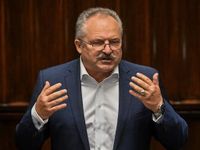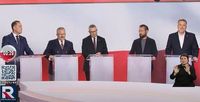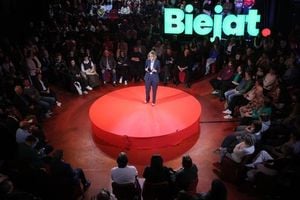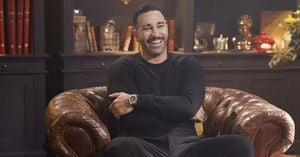On May 9, 2025, a lively presidential debate aired on Telewizja Republika, featuring a new format where experts posed questions instead of traditional moderators. The event, organized by right-wing outlets including Telewizja wPolsce24 and Telewizja Trwam, saw notable absences from candidates Rafał Trzaskowski, Magdalena Biejat, and Maciej Maciak, who opted not to participate.
The debate featured questions from a panel of experts, including InPost CEO Rafał Brzoska, constitutional law professor Ryszard Piotrowski, and Łukasz Jankowski, the president of the Supreme Medical Chamber. Jankowski directed a critical question at the candidates regarding healthcare: "What initiatives will you undertake as President of Poland to improve the health security of Polish citizens?" This question highlighted the pressing need for policies aimed at enhancing the healthcare system amidst growing concerns about its sustainability.
Adrian Zandberg, the candidate from the Razem party, began his response by thanking the viewers of Telewizja Republika for their support in appealing to President Duda to veto a controversial law proposed by Donald Tusk, which Zandberg claimed would undermine healthcare finances. He stated, "We managed to jointly convince President Duda" to block the law that sought to reduce health insurance contributions for entrepreneurs.
This blocked legislation aimed to introduce a two-pronged base for calculating health insurance contributions. The first part was to be a lump sum of 9 percent of 75 percent of the minimum wage, while the second part would be a percentage calculated from income exceeding 1.5 times the average monthly salary. The proposal had already passed through both the Sejm and the Senate, facing opposition from politicians in both the Left and PiS parties.
During the debate, Zandberg did not shy away from addressing the growing demographic challenges Poland faces. He pointed out that the country is aging rapidly, with an increasing number of elderly and disabled individuals requiring assistance. He criticized Karol Nawrocki, a PiS-supported candidate, for failing to mention these vulnerable groups. Zandberg passionately argued, "If the state does not provide support, then of course, there will be one or another crook who will want to extort an apartment from an elderly person and then leave them out in the cold."
This comment was in reference to a recent scandal involving an apartment previously owned by an elderly man named Mr. Jerzy, which had been sold to Nawrocki and his wife. Nawrocki had announced earlier that he would donate the apartment to charity, ensuring that Mr. Jerzy could continue living there until his death. However, Zandberg's remarks highlighted the broader issue of elder exploitation in the absence of state support.
The debate also featured a heated exchange between Zandberg and Marek Jakubiak, who dismissed Zandberg's concerns about housing affordability as a "secondary topic." Jakubiak claimed that the need for housing was not essential for starting a family, which Zandberg vehemently challenged. The two candidates engaged in a back-and-forth discussion, questioning each other's housing situations, with Zandberg revealing he owns just one apartment where he resides.
Jakubiak's comments sparked further criticism, as he recounted how he received his first apartment from the military, a 19-square-meter unit, which many perceived as out of touch with current housing realities. This exchange underscored the ongoing debate about housing prices and their impact on family planning in Poland.
As the debate progressed, Zandberg's criticisms of Brzoska's comments on work ethics resonated with viewers. He remarked, "When I hear a multimillionaire complaining about the work ethic of Polish workers, it makes me question whether he knows who delivers his packages and earns him millions." This critique of Brzoska's privileged perspective highlighted the disconnect between the wealthy and the working class.
Krzysztof Stanowski, another candidate, humorously commented on Brzoska's role in the debate, suggesting that while he might replace journalists, it was more concerning when he was seen as replacing the state in addressing societal issues. Stanowski emphasized that the government should be responsible for solving its own problems rather than relying on private individuals.
The debate's dynamics were further complicated by the recent media coverage of the apartment controversy involving Nawrocki. Reports indicated that Nawrocki and his wife did not need the original owner, Mr. Jerzy, to finalize the transaction, raising ethical questions about their motivations and the implications for elderly care.
As the debate concluded, public interest remained high, with a recent poll conducted by SW Research for "Wprost" revealing that 61.3% of respondents believe the second round of the presidential election will feature Rafał Trzaskowski and the candidate supported by PiS. Meanwhile, 16% of those surveyed anticipated a face-off between Trzaskowski and Sławomir Mentzen, and 11.4% predicted a showdown between Nawrocki and Mentzen.
This debate not only highlighted the candidates' positions on critical issues such as healthcare, housing, and demographic challenges but also showcased the growing tensions and rivalries among them. As the election approaches, these discussions will undoubtedly shape public perception and voting behavior.





